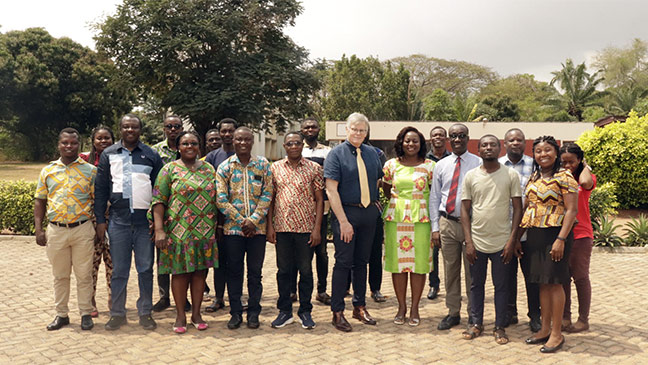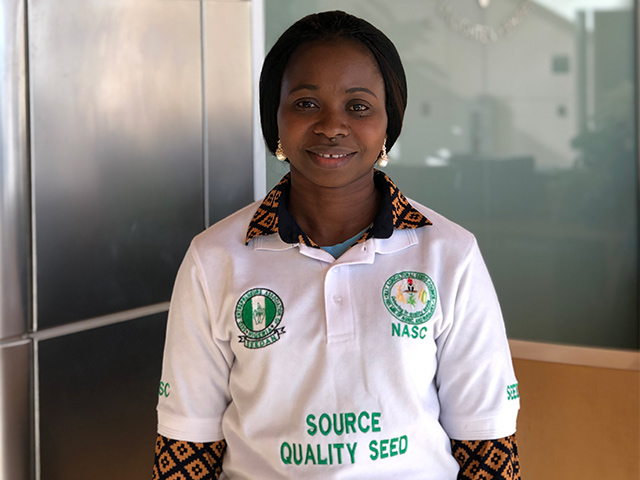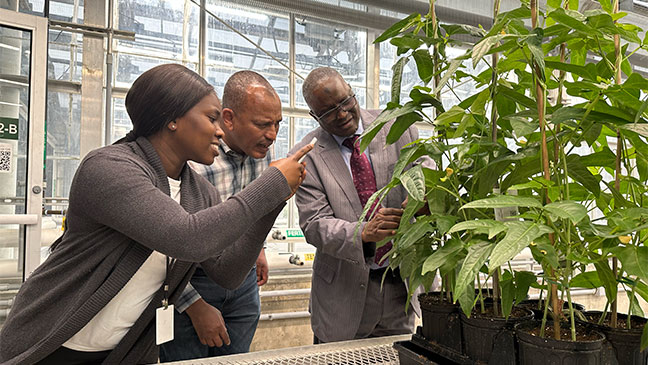Protein for the People: Empowering Our Cowpea Partners for a Sustainable Future
Cowpeas (Vigna unguiculata) are better known in the United States as black-eyed peas. They are protein-rich and drought-tolerant. They grow in semi-arid regions around the world, but especially in West Africa, where they are a vital food security crop for more than 200 million people.
The crop was formerly susceptible to the pod borer—an insect pest that destroyed up to 80% of yield—and required farmers to spray pesticides up to 10 times during the growing season, often without protective gear, and at substantial expense and risk to their health. Seeing the need, a group of international organizations deployed an approach widely used in the US to control insect pests and developed a Bt version of cowpea that demonstrates nearly complete protection against the pod borer.
Whatever we need to achieve in the laboratory, we can learn to do it at the Danforth Center.
Tolulope Rebecca Mewase,
Principal Plant Molecular Scientist, National Agricultural Seeds Council, Nigeria
The Danforth Center helped obtain approval for the new variety, and in 2019, Nigeria made history when it became the first country to approve pod-borer resistant (PBR) cowpea for use. Ghana followed in 2022.

Dr. Don MacKenzie, head of the IICI, participated in an educational seminar for staff of Ghana’s National Biosafety Authority in February. With regulatory assistance from the Danforth Center, PBR cowpea was approved in Nigeria in 2019 and in Ghana in 2022.
Scaling Seed Supply
When the first PBR cowpea seed became available in summer 2021, farmers bought all 7.5 metric tons within days. The demand was there, but the supply? For an improved crop to help the most people and have the most impact requires widespread adoption. Current cowpea seed systems in West Africa are limited in both the quantity and quality of seed they can produce. The goal of project partners is to produce annually 1,000 metric tons of seeds within the next five years. This work simply will not be possible without empowered partners around the world.
Training & Exchange
One of the first partners is the Nigerian National Agricultural Seeds Council. This January, the Danforth Center’s Don MacKenzie, PhD, welcomed candidates to the first licensed seed inspector training in Kano, Nigeria. Among other presenters was Tolulope Rebecca Mewase, who provided an introduction to molecular diagnostics and trait purity testing. Mewase is a seed scientist who previously trained at the Danforth Center in 2018 and 2019 before returning to Nigeria and working to grow the seed certification community there.

In February, Dr. MacKenzie was in Ghana to participate in a training by Ghana’s National Biosafety Authority. The seminar aimed at building the capacity and expertise of Ghanaian staff and stakeholders on genetically modified organisms and genome editing.
In March, the Danforth Center was honored to host Professor Mohammad Ishiyaku, executive director of the Institute for Agricultural Research at Ahmadu Bello University, Nigeria. Dr. Ishiyaku has led the breeding and development of PBR cowpea in Nigeria for over two decades. He spoke on “Mitigating Hunger and Poverty through Effective Partnership" to the Danforth Center community.
Long-Term Sustainable Solutions
The Danforth Center’s Institute for International Crop Improvement (IICI) is dedicated to a simple idea: that no matter where they live, farmers—and the people who depend on them—deserve better crops: crops that are resistant to pest and disease, crops that offer improved nutrition and higher yields, crops that can withstand a changing climate, crops that can lift communities out of poverty.

Professor Mohammad Ishiyaku, head of PBR cowpea development in Nigeria, demonstrating cowpea pollination technique in the Danforth Center greenhouse to Danforth Center scientists Kemi Olofintila (left) and Dr. Getu Duguma (center).
Already the IICI is working with Nigerian farmers to determine the next generation of cowpea innovations. Scientists at the Danforth Center can apply discoveries, lead regulatory efforts, coordinate distribution and education campaigns. But our in-country partners determine the long-term sustainability and ultimate success of these programs—and we are grateful for their partnership.
Thanks to our Partners
The Danforth Plant Science Center is thankful to be a partner in bringing improved cowpea to West Africa with: African Agricultural Technology Foundation (AATF); Commonwealth Scientific and Industrial Research Organisation (CSIRO); Institute for Agricultural Research (IAR) of Ahmadu Bello University, Zaria; Savanna Agricultural Research Institute (SARI), Ghana; Institut de l’Environnement et de Recherches Agricoles (INERA), Burkina Faso; National Agricultural Seeds Council (NASC), Nigeria; and the National Biotechnology Development Agency (NABDA), Nigeria. AATF facilitated the development with funding support from the United States Agency for International Development.
The Need
Danforth Center scientists represent the nation’s best and brightest plant scientists. They are very good at securing grants and partnerships, but these awards and collaborations do not cover all costs for robust programs to improve orphan crops. To support this important work, please consider a gift today.
About
A version of this story originally appeared in the Leaflet, the free newsletter of the Donald Danforth Plant Science Center. Sign up to receive more stories like this straight to your inbox.